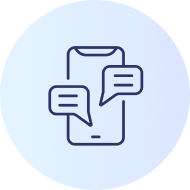Managing marketing across multiple locations creates unique challenges that single-location businesses don’t face. When you add different local markets, varying staff capabilities, and the need for both brand consistency and local relevance, the complexity multiplies quickly. Artificial Intelligence is changing the game for multi-location marketers by automating routine tasks, providing deeper customer insights, and enabling personalization at scale.
In this article, we’ll explore how AI tools can help you overcome the most common multi-location marketing challenges and build more effective campaigns for each of your locations.
Multi-location business marketing challenges
To begin, let’s explore the primary obstacles in marketing across multiple locations.
Maintaining brand consistency
When your business has more than one location, it gets harder to keep your brand’s look, voice, and message the same everywhere. Different locations might understand your brand rules in their own way or make their own marketing materials to fit local needs. This can confuse customers and weaken your brand. If no one is checking, some locations might use old logos, send mixed messages, or use images that don’t follow your brand rules—hurting how people see your business overall.
Coordinating marketing efforts
Each of your locations serves a unique community with distinct preferences, competitors, and seasonal patterns. Balancing locally relevant marketing with your overarching brand strategy requires careful coordination. Local teams often lack the marketing expertise to adapt campaigns effectively, while corporate marketing departments may not understand the nuances of each local market. This disconnect leads to generic campaigns that fail to resonate with local audiences or local initiatives that don’t align with broader business goals.
Resource allocation
Determining how to distribute your marketing budget, tools, and talent across locations presents another significant challenge. High-performing locations might deserve more resources to maximize returns, while struggling locations might need extra support to build momentum. Without clear data on what’s working where, resource allocation often defaults to equal distribution or squeaky-wheel politics rather than strategic investment where it will make the most impact.
Measuring performance
When a business has many locations, it can be hard to track how well marketing is working. Each location might measure different things, use different tools, or define success in different ways. This makes it tough to compare results, see what’s working best, or decide which marketing strategies to use across the whole company.
The benefits of AI in overcoming multi-location marketing challenges
Managing a business across dozens—or hundreds—of locations isn’t for the faint of heart. But Artificial Intelligence isn’t just a buzzword anymore; it’s becoming the secret weapon for untangling the messy, real-world problems that come with scale. Here’s how AI is changing the game for multi-location brands:
Enhancing brand consistency
AI tools can automatically check marketing materials against your brand guidelines, flagging inconsistencies in messaging, imagery, colors, or tone. These systems can review content at scale, ensuring that every piece of marketing collateral—whether created at headquarters or by local teams—maintains brand standards. Some AI platforms can even automatically correct common brand compliance issues or generate on-brand content templates that local teams can customize without compromising your visual identity.
Improving local marketing
AI excels at analyzing location-specific data and recommending tailored approaches for each market. These systems can identify which offers, messages, or creative elements perform best with particular local audiences. By processing vast amounts of customer behavior data, AI helps you understand the unique characteristics of each market and craft campaigns that speak directly to local preferences while maintaining your overall brand positioning.
Centralized control and management
AI-powered marketing platforms provide a single source of truth for all your marketing activities across locations. These centralized systems give corporate teams visibility and control while allowing local teams appropriate access and customization options. With permission-based workflows, you can ensure that marketing materials meet brand standards before going live, all while streamlining approval processes and reducing bottlenecks.
Data-driven insights
AI analytics tools can process data from all your locations simultaneously, identifying patterns and opportunities that would be impossible to spot manually. These systems connect the dots between different marketing channels, customer behaviors, and business outcomes to reveal which strategies drive results in specific markets. By aggregating performance data across locations, AI helps you benchmark results, set realistic goals, and quickly identify both underperforming locations and replicable success stories.
Automation
Perhaps AI’s most immediate benefit is automating repetitive marketing tasks that drain team resources. From scheduling social media posts to generating location-specific ad copy, AI can handle routine activities with minimal human oversight. This automation frees your marketing teams to focus on strategy and creative work that truly requires human insight, while ensuring that essential but mundane tasks still get completed accurately and on time across all locations.
5 Key applications of AI for multi-location business marketing
From simplifying complex operations to sharpening local strategies, AI is reshaping how multi-location brands compete and grow. Below are five impactful ways it’s being put to work—ideas worth exploring for your own marketing playbook:
- Content generation and personalization
- Review and reputation management
- Predictive analytics for localized marketing
- AI-powered chatbots and virtual assistants
- Local search listings
1. Content generation and personalization
AI content tools can create customized marketing materials for each location while maintaining your brand voice. These systems analyze your existing content to understand your messaging patterns, then generate location-specific variations that include relevant local references, offers, and contact information. For example, AI can produce unique social media posts for each location that reference local events or weather conditions while using consistent brand language.
Your marketing team can use AI to create location-specific landing pages, email campaigns, and digital ads that dynamically adjust to highlight services most relevant to each market. Advanced AI can even personalize content down to the individual level, showing different website content or sending different messages based on a customer’s past interactions with your business, regardless of which location they normally visit.
2. Review and reputation management
Managing your online reputation across multiple locations is critical—but time-consuming. AI simplifies this by automatically monitoring reviews on platforms like Google, Yelp, and Facebook, alerting your team to new feedback in real time. It can even suggest context-aware responses or auto-reply to positive reviews, ensuring a consistent brand voice while reducing response time.
AI tools also analyze review patterns across locations, helping you identify what customers appreciate most—and where operations may need improvement. These insights can guide local service enhancements or broader marketing strategy. For example, if one region consistently receives praise for fast service, that can become a focus in messaging for similar markets. When AI supports your review management, you don’t just protect your reputation—you actively improve it.
3. Predictive analytics for localized marketing
AI can uncover emerging local trends by analyzing historical data, seasonal patterns, and external factors like weather or nearby events. These insights help you anticipate spikes in demand and proactively adjust your marketing, staffing, or inventory plans.
It can also identify which audience segments respond best in each area—so you can tailor your approach. For example, AI might suggest family-first messaging in the suburbs and convenience-focused offers in urban neighborhoods. AI helps you meet local expectations before your competitors even notice the shift.
4. AI-powered chatbots and virtual assistants
Using AI chatbots on your website and other digital channels is a great way to make sure customers get quick, helpful answers—any time they reach out, and no matter which location they’re asking about. Today’s AI assistants can handle questions about things like store hours, services, and availability at a specific location, all while keeping your brand voice consistent. And if a question gets too detailed or specific, the chatbot can hand it off to the right local team.
Some virtual assistants even know where your visitors are and can automatically show info for the closest location—like what services are offered, who’s on staff, and when they’re available. That means customers don’t have to dig around to find what they need. It makes the experience smoother, faster, and more likely to lead to a sale—no matter which location they’re looking at.
5. Local search listings
AI can help you keep your local business listings up to date across places like Google, online directories, and maps—so each location shows up clearly when people search. These tools make sure your hours, address, and other info stay accurate everywhere, and they’ll even flag mistakes that could hurt your visibility in search results. Some AI platforms can also suggest local keywords or updates based on what people in the area are actually searching for.
For businesses with lots of locations, keeping listings accurate can be a real headache—but it’s super important for showing up in local searches. AI makes this way easier by constantly checking for errors, tracking how customers interact with your listings, and seeing how you stack up against local competitors. It can even recommend where to focus your efforts to get the biggest boost in visibility.
AI considerations for multi-location marketing
While AI offers tremendous benefits for multi-location marketers, successful implementation requires careful planning and ongoing management. Consider these critical elements:
Human oversight
Even the most advanced AI requires human supervision to ensure quality and brand alignment. Establish clear review processes for AI-generated content, with experienced team members checking for accuracy, tone, and strategic fit. Consider implementing a tiered approval system where routine content can be published with minimal review, while high-stakes or novel campaigns receive more thorough human evaluation. Regular audits of AI outputs will help you refine your systems over time and catch potential issues before they reach your audience.
Data privacy and security
Multi-location businesses handle customer data from a wide range of sources, which brings with it serious privacy and security responsibilities. It’s essential that your AI systems comply with data protection regulations such as HIPAA, GDPR and CCPA, with particular attention to how data is transferred and managed across different locations and platforms.
Establishing robust data governance policies is key—these should cover how data is collected, stored, accessed, and deleted organization-wide. Regular security audits, along with ongoing monitoring is essential.
Adaptation and training
For AI tools to work effectively, your team needs to understand how to use them. Offer training for both corporate and local teams to avoid common missteps and ensure adoption. As tools evolve, ongoing learning will be key to maximizing your AI investment.
Conclusion
AI is changing multi-location marketing from a manual juggling act into a streamlined, data-driven strategy. With the right tools, businesses can localize their efforts, stay consistent across markets, and act on insights in real time. The key is to adopt AI thoughtfully—balancing automation with human oversight, and strategy with flexibility.
Optimize your multi-location marketing with TrueLark
TrueLark’s AI-powered platform helps multi-location businesses streamline marketing, scheduling, and patient communications. From automated lead engagement to hyperlocal messaging and real-time reporting, we help your team execute smarter campaigns with less effort.
With features like:
You’ll have everything you need to scale faster and communicate smarter. Ready to see what TrueLark can do for your business? Book a demo today.




















